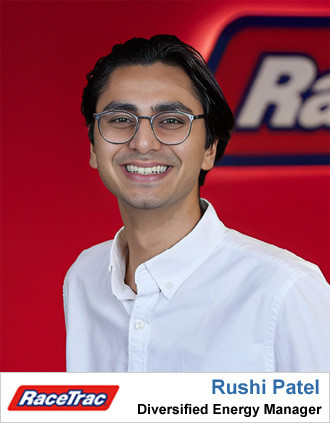
How does a company come within 11 years of celebrating 100 years of being a great success? Rushi Patel thinks he knows. "You stay true to core values while making practical changes to be ready for the future," he says.
Rushi, the Diversified Energy Manager at Atlanta based RaceTrac, started with the company in the job of using technology to lower energy costs at RaceTrac’s convenience stores. "After 18 months, I moved to RaceTrac's wholly owned subsidiary, Metroplex Energy, to help figure out how to help the company diversify our fuel supply," he says. "Providing electron based fueling for electric vehicles is definitely in our future."
The Atlanta native grew up in Marietta, attended Wheeler High School, was admitted to Georgia Tech as a Hope Scholar for all four years and, as a Resident Assistant, received free lodging and meals all four years. "I was very fortunate in my college experience and Tech was a fantastic environment to grow and learn," he says.
His senior project at Tech was work on the Kendeda Building for Innovative Sustainable Design. It was the first building in Georgia - and only the 28th in the world - to earn Living Building Challenge (LBC) certification, the world’s most ambitious and holistic green building achievement. Rushi graduated with a degree in Environmental Engineering and worked for two years as a project manager at CxGBS, a green building solutions provider, before joining RaceTrac in 2019.
Family-owned RaceTrac has been serving guests since 1934. In total, RaceTrac employs more than 10,200 team members across its two divisions - RaceTrac and RaceWay - and affiliated companies Metroplex Energy and Energy Dispatch.
"Our company has a primarily southeastern US footprint," says Rushi, "with 567 RaceTrac stores and 217 RaceWay stores."
In his first year at Metroplex, Rushi worked on figuring out Electric Vehicle (EV) charging and building the business case for RaceTrac to diversify its fuel offerings. "Our team is also looking at other fuel possibilities, such as natural gas and hydrogen. We took a full year to fully understand EV charging and present our findings to senior leadership," he says. "The company knew it needed to focus on an important and growing market."
In the second year, Rushi and his team took their information and began to turn them into business plans. "We needed to understand what EVs meant for the architecture of our stores, for example, what retrofitting existing stores would entail and how would construction of new stores in the future be different," he says. "The goal is to make EV charging fast and frictionless, to make it a pleasant RaceTrac experience."
"We expect to roll out the first RaceTrac charging stations in the near future," he says, "and we're pretty excited about it."
Rushi is confident that the convenience store industry is the right industry to bring EV charging to the US broadly and make it ubiquitous. But RaceTrac will also remain true to its "natural growth" philosophy. "We will focus on putting charging stations in areas the market supports that investment," says Rushi.
All in all, Rushi is extremely happy with the work he is doing today and the company he works for. "I work at an amazing place. RaceTrac firmly believes in servant leadership and puts it in practice every day. There are no offices and all work spaces are the same size from the CEO on down. Everyone is approachable and open to new ideas," he says.
"You know, my parents wanted me to be a doctor, but I wanted to become an Environmental Engineer. While I thought that I could make it work, I had no idea that I would be able to do what I'm doing today for such a great company. The opportunity at RaceTrac has been immense," he says, "and I’m excited to see what the future holds."